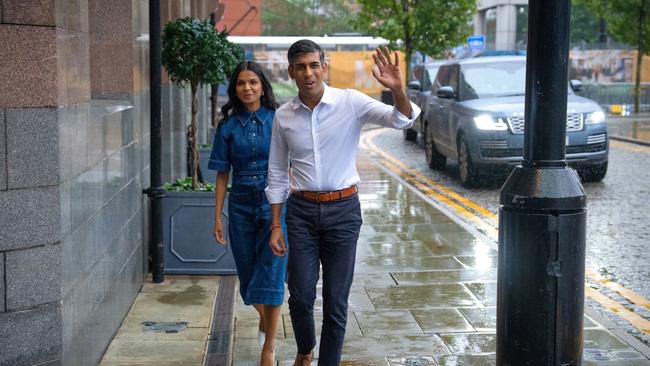UK Tories bid to kickstart resurgence at annual conference
The four-day gathering in Manchester will be Prime Minister Rishi Sunak’s first since he became Tory leader last October.

The British Conservative Party began its annual conference overnight on Sunday, bidding to kickstart a resurgence before an election expected next year that it is on track to lose.
The four-day gathering in Manchester was to be Prime Minister Rishi Sunak’s first since he became Tory leader last October, and likely the last before the election.
His party has been in power since 2010 and looks increasingly beleaguered amid widespread economic woes, which first set in under Mr Sunak’s much-maligned predecessors Liz Truss and Boris Johnson.
The main Labour opposition, which starts its yearly conference in Liverpool next Sunday, has opened up double-digit poll leads and is increasingly readying for a return to governing.
Mr Sunak – who must hold an election by January 2025 at the latest – will try to use the conference to rejuvenate his flagging Tories and set out a broader, more populist, policy agenda.
“This week offers us a chance to set out our values to the British people, to commit ourselves to the cause and prepare for the election next year,” he wrote in a welcome message to attendees.
“The stakes in the general election next year have never been higher.”
Voters would have a choice between “two different ways of doing politics”, he said, vowing to govern “in the long-term interests of the country”.
Party chairman Greg Hands was to kick off proceedings with a main stage address at 2pm on Sunday (12am Monday AEDT).
Recently appointed Defence Secretary Grant Shapps and Foreign Secretary James Cleverly were also to make speeches.
Monday’s headline speakers include Chancellor of the Exchequer Jeremy Hunt, while on Tuesday Home Secretary Suella Braverman delivers a keynote address. Mr Sunak will close the conference with his speech at Wednesday lunchtime.
Meanwhile, ministers, Tory big-hitters, activists, commentators and others will feature in various fringe events.
They include former prime minister Ms Truss, whose only conference as Conservative leader last year was overshadowed by her disastrous mini-budget unveiled less than two weeks earlier.
It rattled financial markets and its impact continues to be felt across the economy, as well as in polling about trust in the Conservatives’ handling of it.
Amid widespread Tory dismay at record post-WWII tax levels, dozens of senior MPs, including Ms Truss, revealed on Friday that they had signed a pledge not to vote for Mr Hunt’s November mini-budget if it contained any rates increases.
Another high-profile party figure, Mr Johnson, is absent from the published conference agenda. He was forced from Downing Street just over a year ago following myriad scandals, and resigned as a Conservative MP in June before being ousted by his peers. They had found he deliberately misled them during the “Partygate” scandal.
Mr Sunak has spent much of his first year in charge trying to stabilise Britain’s crisis-hit economic situation, amid the worst cost-of-living crisis in a generation and – until recent months – double-digit inflation.
But with his party trailing Labour badly in polls throughout that time, he has shifted strategy in recent weeks in an apparent bid to draw clear dividing lines with its rival. There has been a flurry of announcements and leaks on everything from climate change and road policies to infrastructure spending.
On Friday, he unveiled plans to “support drivers” and push back on “anti-car measures” amid a growing number of local authority restrictions on vehicles and where they can be driven in the name of environmental protection. It follows a softening of green policies aimed at achieving net-zero carbon emissions by 2050 announced last week.
He is also reportedly poised to cancel a costly high-speed train line between Birmingham and Manchester, and shake-ups to education policy and inheritance tax have also been rumoured.
AFP



To join the conversation, please log in. Don't have an account? Register
Join the conversation, you are commenting as Logout